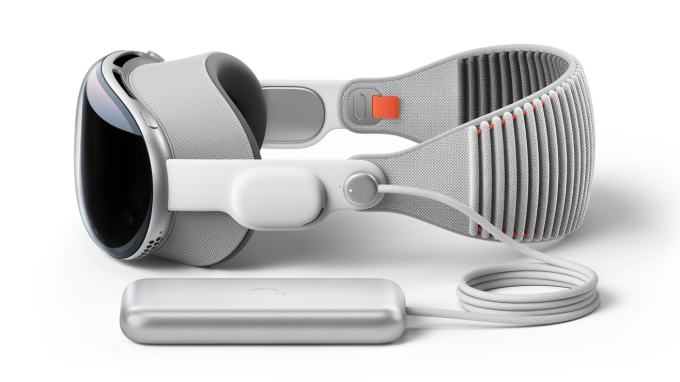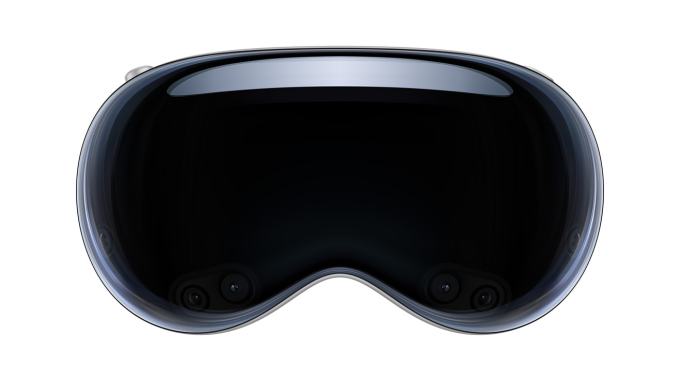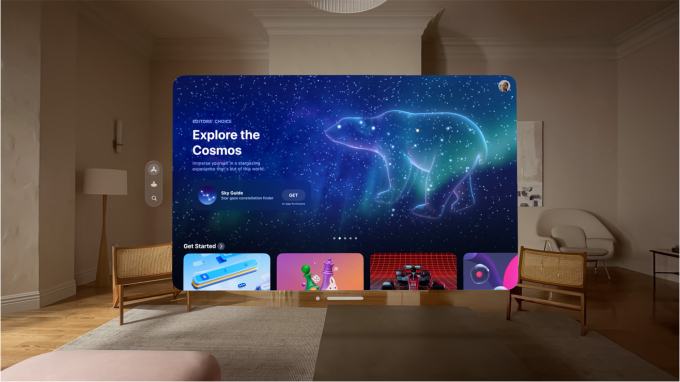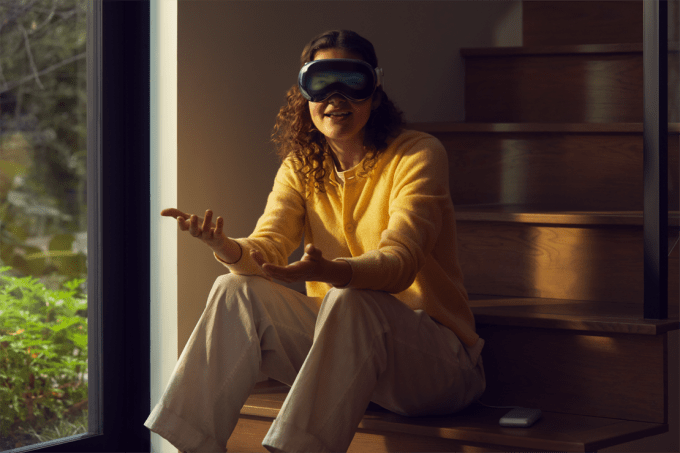After a roughly 30 minute demo that ran through the major features that are yet ready to test I came away convinced that Apple has delivered nothing less than a genuine leapfrog in capability and execution of XR — or mixed reality with its new Apple Vision Pro.
To be super clear, I’m not saying it delivers on all promises, is a genuinely new paradigm in computing or any other high powered claim that Apple hopes to deliver on once it ships. I will need a lot more time with the device than a guided demo.
But, I’ve used essentially every major VR headset and AR device since 2013’s Oculus DK1 right up through the latest generations of Quest and Vive headsets. I’ve tried all of the experiences and stabs at making fetch happen when it comes to XR. I’ve been awed and re-awed as developers of the hardware and software of those devices and their marquee apps have continued to chew away at the “conundrum of the killer app” — trying to find something that would get real purchase with the broader public.
There are some genuine social, narrative or gaming successes like Gorilla Tag, VRChat or Cosmonius. I’ve also been moved by first person experiences by Sundance filmmakers highlighting the human (or animal) condition.
But none of them had the advantages that Apple brings to the table with Apple Vision Pro. Namely, 5,000 patents filed over the past few years and an enormous base of talent and capital to work with. Every bit of this thing shows Apple-level ambition. I don’t know whether it will be the ‘next computing mode’, but you can see the conviction behind each of the choices made here. No corners cut. Full tilt engineering on display.
The hardware is good, very good, with 24 million pixels across the two panels, orders of magnitude more than any headsets most consumers have come in contact with. The optics are better, the headband is comfortable and quickly adjustable and there is a top strap for weight relief. Apple says it is still working on which light seal (the cloth shroud) options to ship with it when it releases officially but the default one was comfortable for me. They aim to ship them with varying sizes and shapes to fit different faces. The power connector has a great little design as well that interconnects using internal pin-type power linkages with an external twist lock.
There is also a magnetic solution for some (but not all) optical adjustments people with differences in vision may need. The onboarding experience features an automatic eye-relief calibration matching the lenses to the center of your eyes. No manual wheels adjusting that here.
The main frame and glass piece look fine, though it’s worth mentioning that they are very substantial in size. Not heavy, per-se, but definitely present.
If you have experience with VR at all then you know that the two big barriers most people hit are either latency driven nausea or the isolation that long sessions wearing something over your eyes can deliver.
Apple has mitigated both of those head on. The R1 chip that sits alongside the M1 chip has a system-wide polling rate of 12ms, and I noticed no judder or framedrops. There was a slight motion blur effect used in the passthrough mode but it wasn’t distracting. The windows themselves rendered crisply and moved around snappily.
Of course, Apple was able to mitigate those issues due to a lot of completely new and original hardware. Everywhere you look here there’s a new idea, a new technology or a new implementation. All of that new comes at a price, $3,500 is on the high end of expectations and firmly places the device in the power user category for early adopters.
Here’s what Apple got right that other headsets just couldn’t nail down:
The eye tracking and gesture control is near perfect. The hand gestures are picked up anywhere around the headset, that includes on your lap or low and away resting on a chair or couch. Many other hand tracking interfaces force you to keep your hands up in front of you, which is tiring. Apple has high resolution cameras dedicated to the bottom of the device just to keep track of your hands. Similarly, an eye tracking array inside means that, after calibration, nearly everything you look at is precisely highlighted. A simple low-effort tap of your fingers and boom, it works.
Passthrough is a major key. Having a real-time 4k view of the world around you that includes any humans in your personal space is so important for long-session VR or AR wear. There is a deep animal brain thing in most humans that makes us really, really uncomfortable if we can’t see our surroundings for a length of time. Eliminating that worry by passing through an image should improve the chance of long use times. There’s also a clever ‘breakthrough’ mechanism that automatically passes a person who comes near you through your content, alerting you to the fact that they’re approaching. The eyes on the outside, which change appearance depending on what you’re doing, also provide a nice context cue for those outside.
The resolution means that text is actually readable. Apple’s positioning of this as a full on computing device only makes sense if you can actually read text in it. All of the previous iterations of ‘virtual desktop’ setups have relied on panels and lenses that present too blurry a view to reliably read fine text at length. In many cases it literally hurt to do so. Not with the Apple Vision Pro – text is super crisp and legible at all sizes and at far ‘distances’ within your space.
There were a handful of really surprising moments from my short time with the headset as well. Aside from the sharpness of the display and the snappy responsiveness of the interface, the entire suite of samples oozed attention to detail.
The Personas Play. I was HIGHLY doubtful that Apple could pull off a workable digital avatar based off of just a scan of your face using the Vision Pro headset itself. Doubt crushed. I’d say that if you’re measuring the digital version of you that it creates to be your avatar in facetime calls and other areas it has a solid set of toes on the other side of the uncanny valley. It’s not totally perfect, but they got skin tension and muscle work right, the expressions they have you make are used to interpolate out a full range of facial contortions using machine learning models and the brief interactions I had with a live person on a call (and it was live, I checked by asking ‘off script’ stuff) did not feel creepy or odd, it worked.
It’s crisp. I’m sort of stating this again but, really, it’s crisp as hell. Running right up to demos like the 3D dinosaur you got right down to the texture level and beyond.
3D Movies are actually good in it. Jim Cameron probably had a moment when he saw Avatar: Way of Water on the Apple Vision Pro. This thing was absolutely born to make the 3D format sing — and it can display them pretty much right away so there’s going to be a decent library of shot on 3D movies that will bring new life to them all. The 3D photos and videos you can take with Apple Vision Pro directly also look super great, but I wasn’t able to test capturing any myself so I don’t know how that will feel yet, awkward? Hard to say.
The setup is smooth and simple. A couple of minutes and you’re good to go, very Apple.
Yes, it does look that good. The output of the interface and the various apps are so good that Apple just used them directly off of the device in its keynote. The interface is bright and bold and feels present because of the way it interacts with other windows, casts shadows on the ground and reacts to lighting conditions.
Overall, I’m hesitant to make any broad claims about whether Apple Vision Pro is going to fulfill Apple’s claims about the onset of spatial computing. I’ve had far too little time with it and it’s not even completed — Apple is still working on things like the light shroud and definitely on many software aspects.
It is, however, really, really well done. The platonic ideal of an XR headset. Now, we wait to see what developers and Apple accomplish over the next few months and how the public reacts.
First impressions: Yes, Apple Vision Pro works and yes, it’s good. by Matthew Panzarino originally published on TechCrunch



